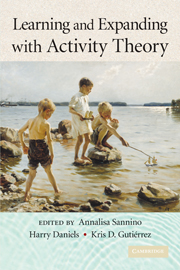Book contents
- Frontmatter
- Contents
- Contributors
- Editors' introduction
- 1 Activity Theory Between Historical Engagement and Future-Making Practice
- PART ONE UNITS OF ANALYSIS
- PART TWO MEDIATION AND DISCOURSE
- PART THREE EXPANSIVE LEARNING AND DEVELOPMENT
- PART FOUR SUBJECTIVITY, AGENCY, AND COMMUNITY
- 12 From the Systemic to the Relational: Relational Agency and Activity Theory
- 13 Expansive Agency in Multi-Activity Collaboration
- 14 The Communicative Construction of Community: Authority and Organizing
- 15 Research Leadership: Productive Research Communities and the Integration of Research Fellows
- PART FIVE INTERVENTIONS
- Bibliography
- Author Index
- Subject Index
15 - Research Leadership: Productive Research Communities and the Integration of Research Fellows
Published online by Cambridge University Press: 05 June 2012
- Frontmatter
- Contents
- Contributors
- Editors' introduction
- 1 Activity Theory Between Historical Engagement and Future-Making Practice
- PART ONE UNITS OF ANALYSIS
- PART TWO MEDIATION AND DISCOURSE
- PART THREE EXPANSIVE LEARNING AND DEVELOPMENT
- PART FOUR SUBJECTIVITY, AGENCY, AND COMMUNITY
- 12 From the Systemic to the Relational: Relational Agency and Activity Theory
- 13 Expansive Agency in Multi-Activity Collaboration
- 14 The Communicative Construction of Community: Authority and Organizing
- 15 Research Leadership: Productive Research Communities and the Integration of Research Fellows
- PART FIVE INTERVENTIONS
- Bibliography
- Author Index
- Subject Index
Summary
In this chapter we focus on what can be described as especially productive research groups and communities. We take cultural-historical activity theory as the premise and focus on how we can understand research groups' work when using the concept of object as our main analytic concept (Engeström, 1987). Policy studies of research emphasize that the organization and funding of research are going through changes, from individual to collective models. The question then becomes, what does this mean for the researchers in their everyday activities? This trajectory, which has been seen for a long time within the research disciplines and communities of medicine, science, and technology, is starting to influence and play a significant role in the “text subjects” within social science, educational science, and the humanities. These areas are probably the fields of research where this trend in research development is currently at its weakest.
The shift in models can be illustrated by new arrangements like Centres of Excellence (CoE), Centres for Research-Based Innovation (CRIs), and Networks of Excellence in the European Union that aim to create better conditions for elite research, which will lead globalized knowledge production and in so doing expand research frontiers. As part of these efforts, the development of more focused and defined doctoral and postdoctoral research schools is taking place. These new research models are implemented across fields of sciences in Europe and in the United States.
- Type
- Chapter
- Information
- Learning and Expanding with Activity Theory , pp. 240 - 254Publisher: Cambridge University PressPrint publication year: 2009
- 2
- Cited by



